Reflective Report: CVF Competency Framework & Management Mastery
VerifiedAdded on 2023/03/31
|9
|1790
|121
Report
AI Summary
This assignment presents a reflective report on the Competing Values Framework (CVF) and its application to management competencies. Part A involves a comparison of two CVF self-assessments, highlighting changes in competency across different managerial roles (collaborate, create, compete, and control) and discussing strategies for improvement. The reflection incorporates literature and learning from community blogs to support the analysis. Part B examines competing values, paradoxical views, and complementary models identified in a community blog, emphasizing their importance in tourism, hospitality, and event management. The report references articles discussing the influence of external factors like political instability and technology on the tourism industry, as well as the importance of employee motivation and a creative work environment. It concludes that mastering competing values is crucial for success in the travel and tourism and hospitality sectors.
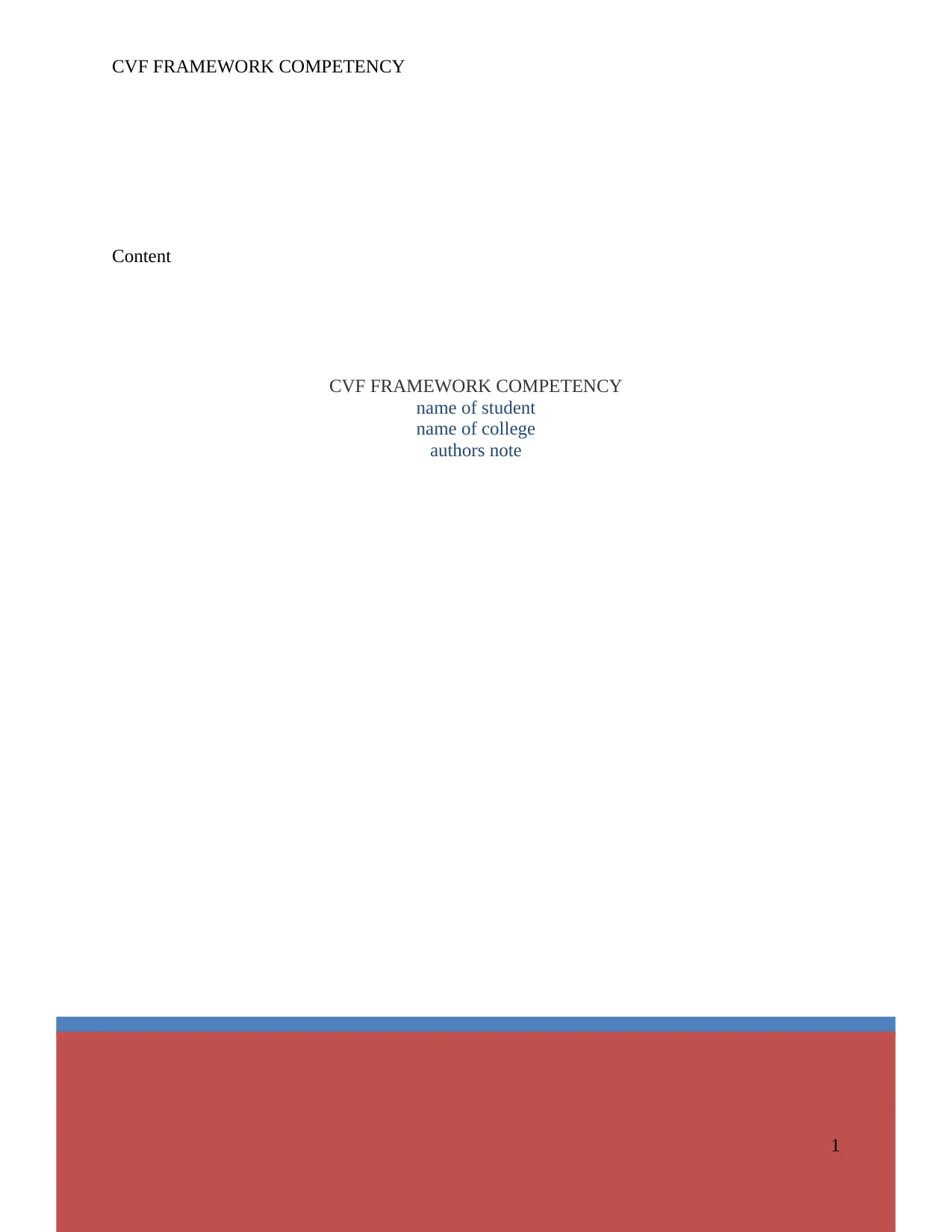
CVF FRAMEWORK COMPETENCY
name of student
name of college
authors note
CVF FRAMEWORK COMPETENCY
Content
1
name of student
name of college
authors note
CVF FRAMEWORK COMPETENCY
Content
1
Paraphrase This Document
Need a fresh take? Get an instant paraphrase of this document with our AI Paraphraser
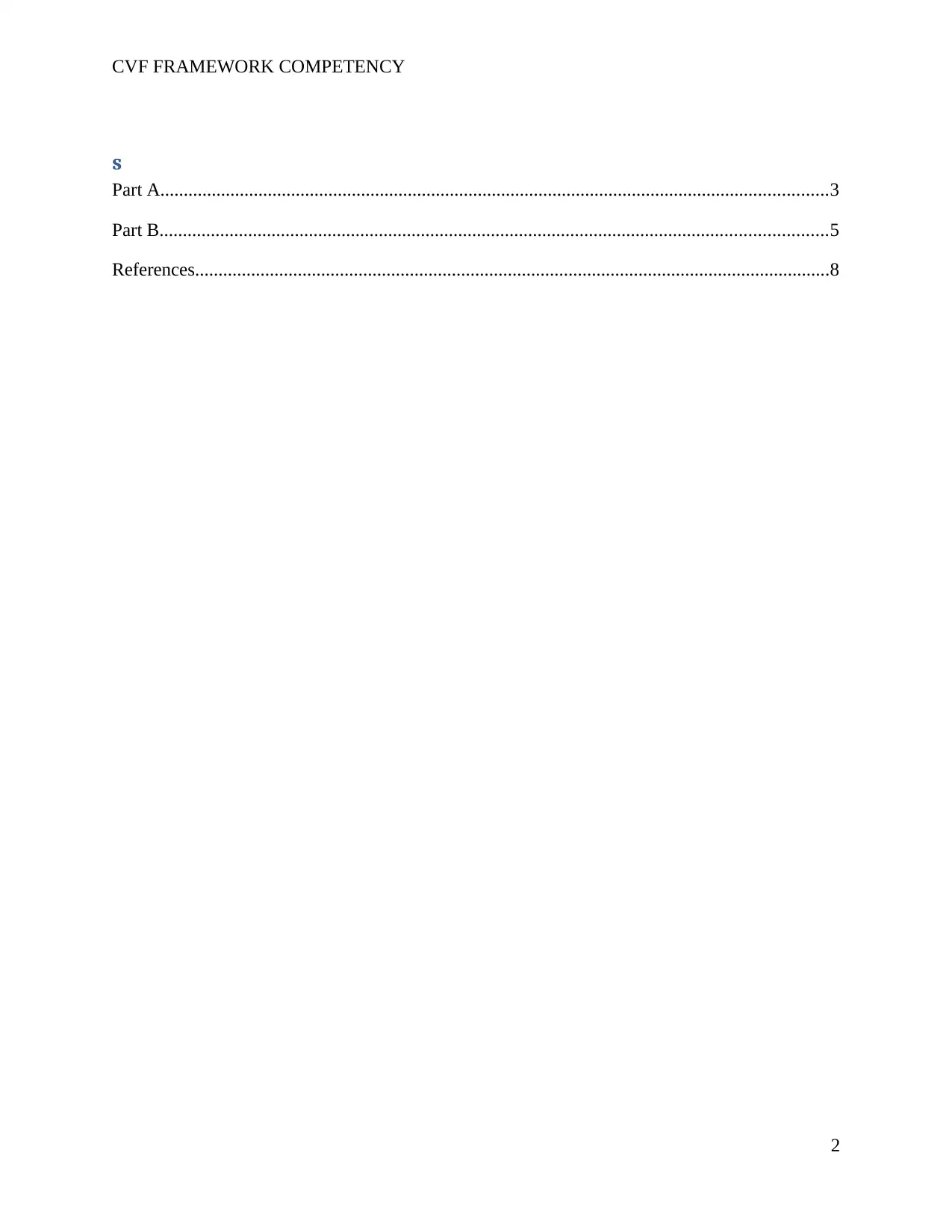
CVF FRAMEWORK COMPETENCY
s
Part A...............................................................................................................................................3
Part B...............................................................................................................................................5
References........................................................................................................................................8
2
s
Part A...............................................................................................................................................3
Part B...............................................................................................................................................5
References........................................................................................................................................8
2
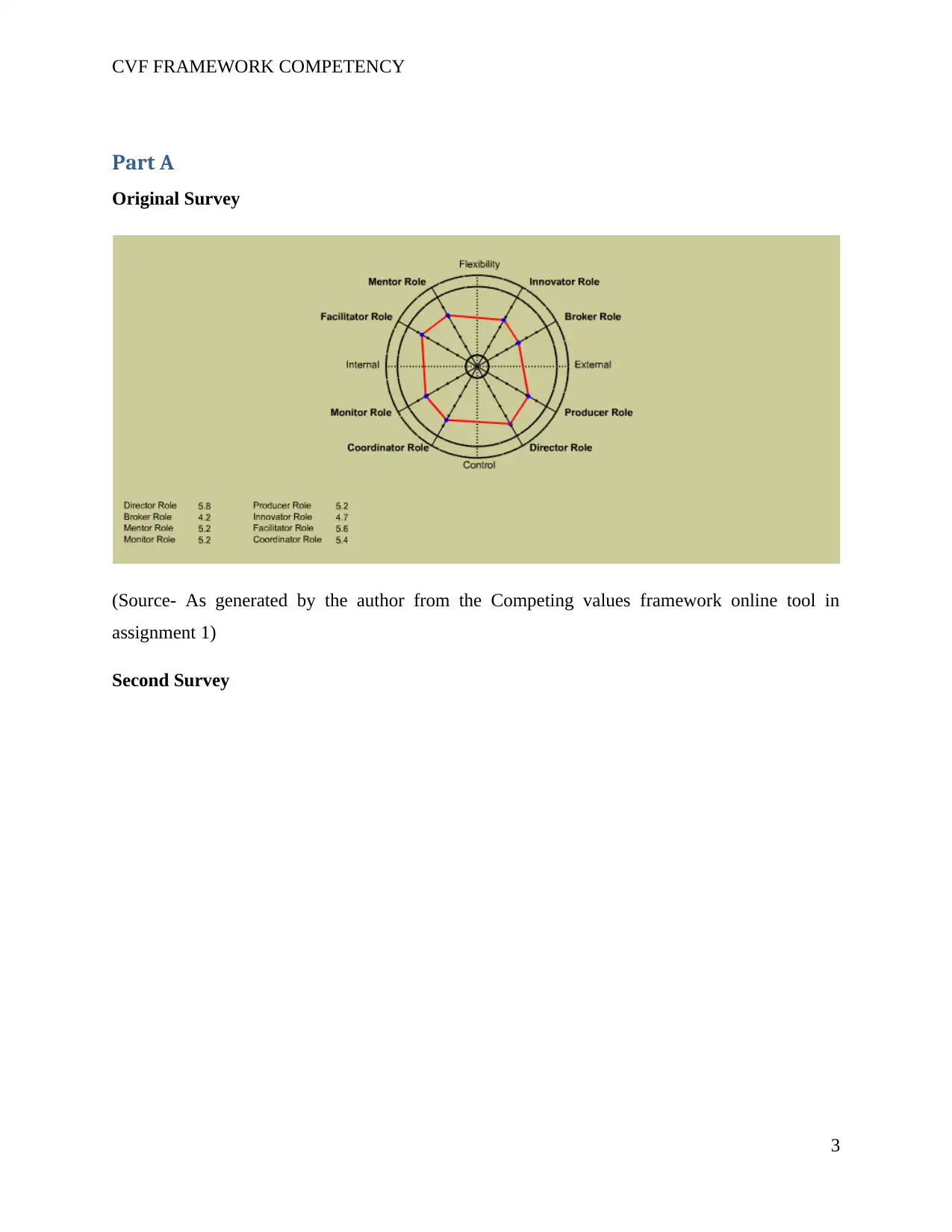
CVF FRAMEWORK COMPETENCY
Part A
Original Survey
(Source- As generated by the author from the Competing values framework online tool in
assignment 1)
Second Survey
3
Part A
Original Survey
(Source- As generated by the author from the Competing values framework online tool in
assignment 1)
Second Survey
3
⊘ This is a preview!⊘
Do you want full access?
Subscribe today to unlock all pages.

Trusted by 1+ million students worldwide
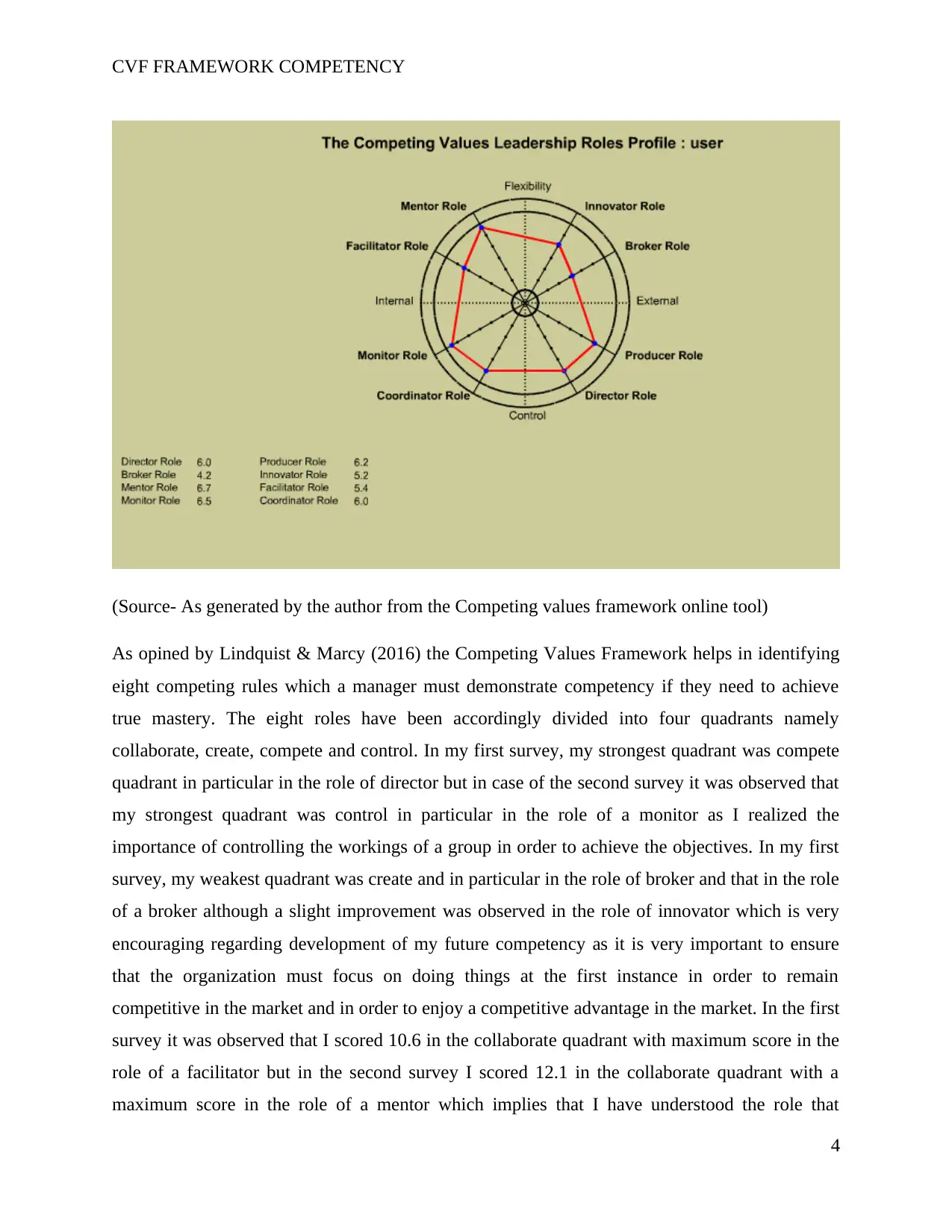
CVF FRAMEWORK COMPETENCY
(Source- As generated by the author from the Competing values framework online tool)
As opined by Lindquist & Marcy (2016) the Competing Values Framework helps in identifying
eight competing rules which a manager must demonstrate competency if they need to achieve
true mastery. The eight roles have been accordingly divided into four quadrants namely
collaborate, create, compete and control. In my first survey, my strongest quadrant was compete
quadrant in particular in the role of director but in case of the second survey it was observed that
my strongest quadrant was control in particular in the role of a monitor as I realized the
importance of controlling the workings of a group in order to achieve the objectives. In my first
survey, my weakest quadrant was create and in particular in the role of broker and that in the role
of a broker although a slight improvement was observed in the role of innovator which is very
encouraging regarding development of my future competency as it is very important to ensure
that the organization must focus on doing things at the first instance in order to remain
competitive in the market and in order to enjoy a competitive advantage in the market. In the first
survey it was observed that I scored 10.6 in the collaborate quadrant with maximum score in the
role of a facilitator but in the second survey I scored 12.1 in the collaborate quadrant with a
maximum score in the role of a mentor which implies that I have understood the role that
4
(Source- As generated by the author from the Competing values framework online tool)
As opined by Lindquist & Marcy (2016) the Competing Values Framework helps in identifying
eight competing rules which a manager must demonstrate competency if they need to achieve
true mastery. The eight roles have been accordingly divided into four quadrants namely
collaborate, create, compete and control. In my first survey, my strongest quadrant was compete
quadrant in particular in the role of director but in case of the second survey it was observed that
my strongest quadrant was control in particular in the role of a monitor as I realized the
importance of controlling the workings of a group in order to achieve the objectives. In my first
survey, my weakest quadrant was create and in particular in the role of broker and that in the role
of a broker although a slight improvement was observed in the role of innovator which is very
encouraging regarding development of my future competency as it is very important to ensure
that the organization must focus on doing things at the first instance in order to remain
competitive in the market and in order to enjoy a competitive advantage in the market. In the first
survey it was observed that I scored 10.6 in the collaborate quadrant with maximum score in the
role of a facilitator but in the second survey I scored 12.1 in the collaborate quadrant with a
maximum score in the role of a mentor which implies that I have understood the role that
4
Paraphrase This Document
Need a fresh take? Get an instant paraphrase of this document with our AI Paraphraser
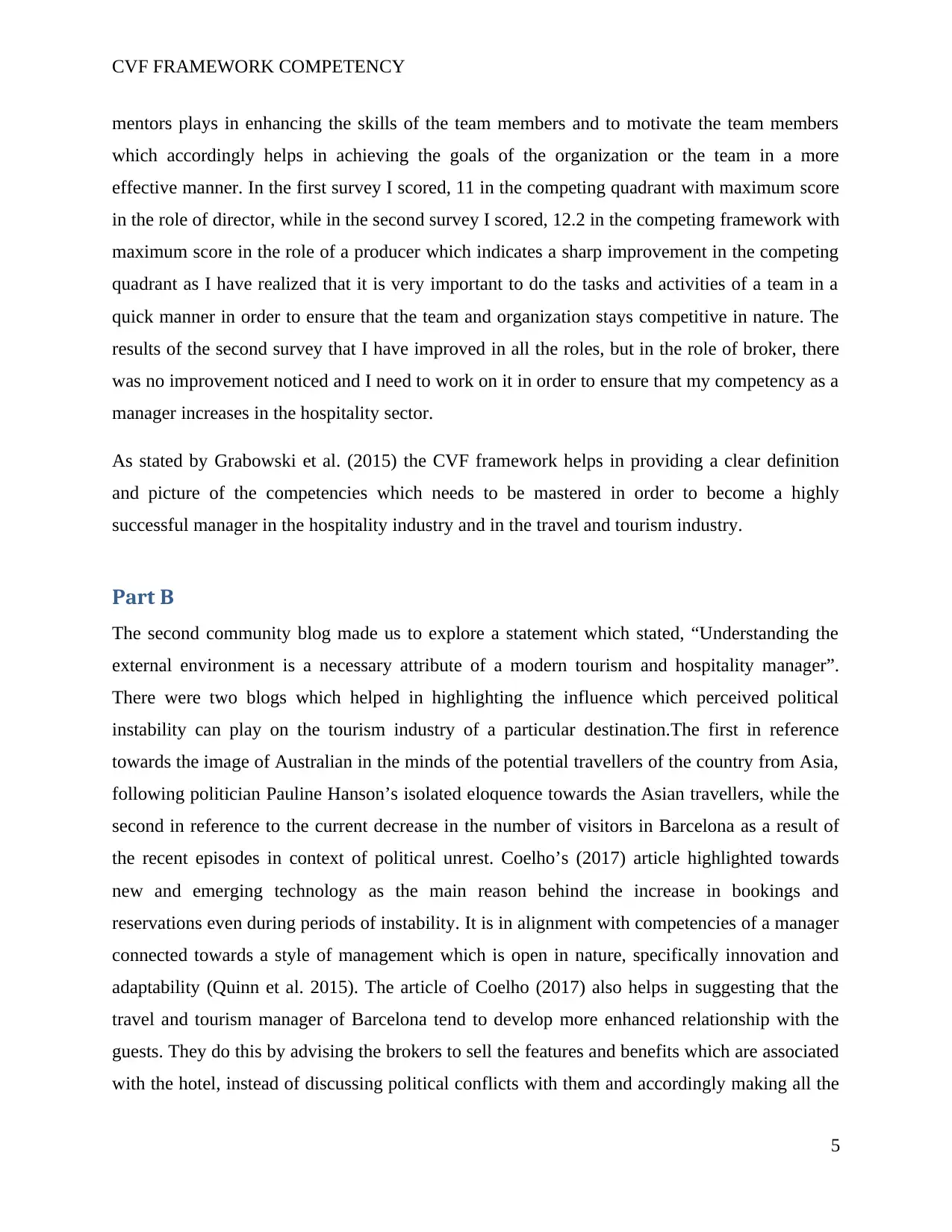
CVF FRAMEWORK COMPETENCY
mentors plays in enhancing the skills of the team members and to motivate the team members
which accordingly helps in achieving the goals of the organization or the team in a more
effective manner. In the first survey I scored, 11 in the competing quadrant with maximum score
in the role of director, while in the second survey I scored, 12.2 in the competing framework with
maximum score in the role of a producer which indicates a sharp improvement in the competing
quadrant as I have realized that it is very important to do the tasks and activities of a team in a
quick manner in order to ensure that the team and organization stays competitive in nature. The
results of the second survey that I have improved in all the roles, but in the role of broker, there
was no improvement noticed and I need to work on it in order to ensure that my competency as a
manager increases in the hospitality sector.
As stated by Grabowski et al. (2015) the CVF framework helps in providing a clear definition
and picture of the competencies which needs to be mastered in order to become a highly
successful manager in the hospitality industry and in the travel and tourism industry.
Part B
The second community blog made us to explore a statement which stated, “Understanding the
external environment is a necessary attribute of a modern tourism and hospitality manager”.
There were two blogs which helped in highlighting the influence which perceived political
instability can play on the tourism industry of a particular destination.The first in reference
towards the image of Australian in the minds of the potential travellers of the country from Asia,
following politician Pauline Hanson’s isolated eloquence towards the Asian travellers, while the
second in reference to the current decrease in the number of visitors in Barcelona as a result of
the recent episodes in context of political unrest. Coelho’s (2017) article highlighted towards
new and emerging technology as the main reason behind the increase in bookings and
reservations even during periods of instability. It is in alignment with competencies of a manager
connected towards a style of management which is open in nature, specifically innovation and
adaptability (Quinn et al. 2015). The article of Coelho (2017) also helps in suggesting that the
travel and tourism manager of Barcelona tend to develop more enhanced relationship with the
guests. They do this by advising the brokers to sell the features and benefits which are associated
with the hotel, instead of discussing political conflicts with them and accordingly making all the
5
mentors plays in enhancing the skills of the team members and to motivate the team members
which accordingly helps in achieving the goals of the organization or the team in a more
effective manner. In the first survey I scored, 11 in the competing quadrant with maximum score
in the role of director, while in the second survey I scored, 12.2 in the competing framework with
maximum score in the role of a producer which indicates a sharp improvement in the competing
quadrant as I have realized that it is very important to do the tasks and activities of a team in a
quick manner in order to ensure that the team and organization stays competitive in nature. The
results of the second survey that I have improved in all the roles, but in the role of broker, there
was no improvement noticed and I need to work on it in order to ensure that my competency as a
manager increases in the hospitality sector.
As stated by Grabowski et al. (2015) the CVF framework helps in providing a clear definition
and picture of the competencies which needs to be mastered in order to become a highly
successful manager in the hospitality industry and in the travel and tourism industry.
Part B
The second community blog made us to explore a statement which stated, “Understanding the
external environment is a necessary attribute of a modern tourism and hospitality manager”.
There were two blogs which helped in highlighting the influence which perceived political
instability can play on the tourism industry of a particular destination.The first in reference
towards the image of Australian in the minds of the potential travellers of the country from Asia,
following politician Pauline Hanson’s isolated eloquence towards the Asian travellers, while the
second in reference to the current decrease in the number of visitors in Barcelona as a result of
the recent episodes in context of political unrest. Coelho’s (2017) article highlighted towards
new and emerging technology as the main reason behind the increase in bookings and
reservations even during periods of instability. It is in alignment with competencies of a manager
connected towards a style of management which is open in nature, specifically innovation and
adaptability (Quinn et al. 2015). The article of Coelho (2017) also helps in suggesting that the
travel and tourism manager of Barcelona tend to develop more enhanced relationship with the
guests. They do this by advising the brokers to sell the features and benefits which are associated
with the hotel, instead of discussing political conflicts with them and accordingly making all the
5
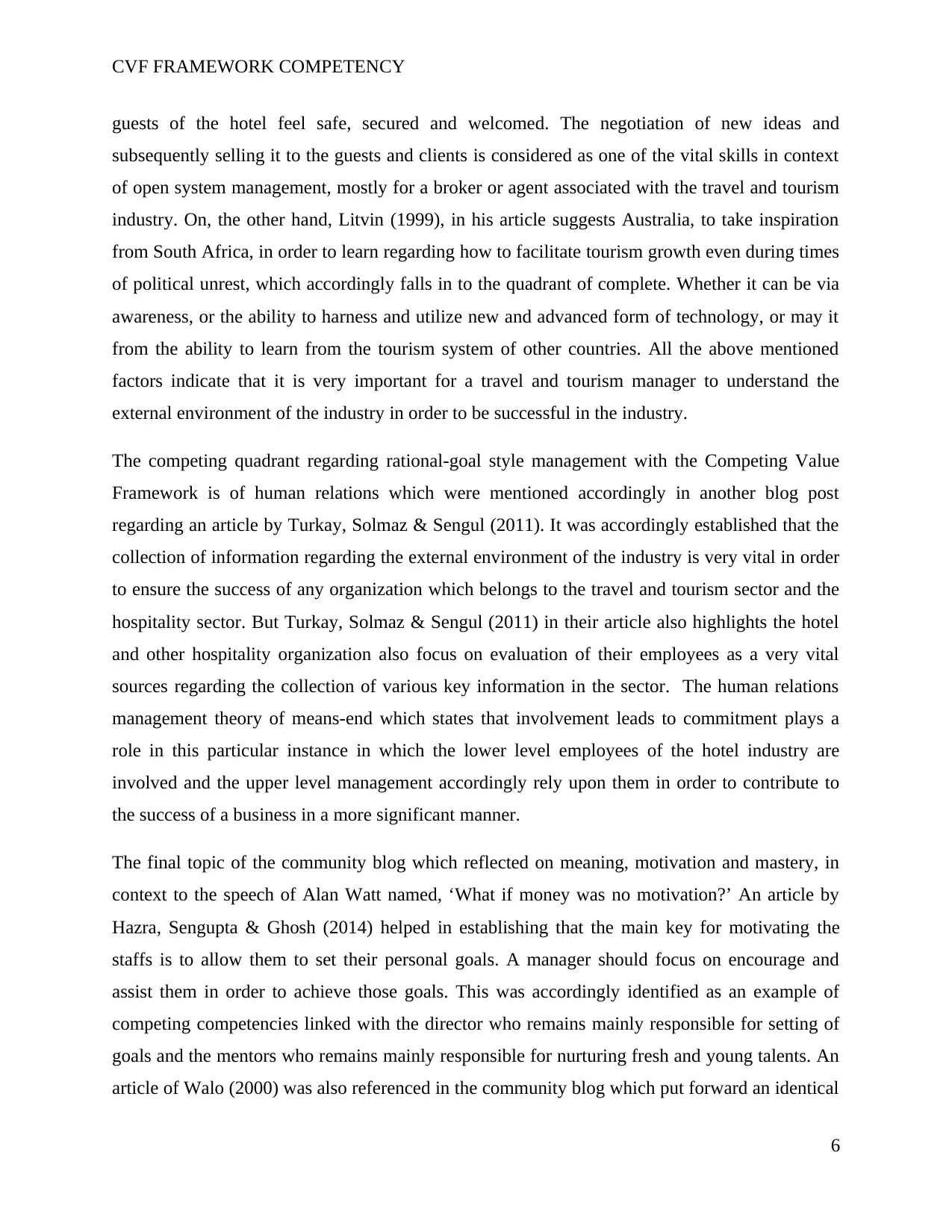
CVF FRAMEWORK COMPETENCY
guests of the hotel feel safe, secured and welcomed. The negotiation of new ideas and
subsequently selling it to the guests and clients is considered as one of the vital skills in context
of open system management, mostly for a broker or agent associated with the travel and tourism
industry. On, the other hand, Litvin (1999), in his article suggests Australia, to take inspiration
from South Africa, in order to learn regarding how to facilitate tourism growth even during times
of political unrest, which accordingly falls in to the quadrant of complete. Whether it can be via
awareness, or the ability to harness and utilize new and advanced form of technology, or may it
from the ability to learn from the tourism system of other countries. All the above mentioned
factors indicate that it is very important for a travel and tourism manager to understand the
external environment of the industry in order to be successful in the industry.
The competing quadrant regarding rational-goal style management with the Competing Value
Framework is of human relations which were mentioned accordingly in another blog post
regarding an article by Turkay, Solmaz & Sengul (2011). It was accordingly established that the
collection of information regarding the external environment of the industry is very vital in order
to ensure the success of any organization which belongs to the travel and tourism sector and the
hospitality sector. But Turkay, Solmaz & Sengul (2011) in their article also highlights the hotel
and other hospitality organization also focus on evaluation of their employees as a very vital
sources regarding the collection of various key information in the sector. The human relations
management theory of means-end which states that involvement leads to commitment plays a
role in this particular instance in which the lower level employees of the hotel industry are
involved and the upper level management accordingly rely upon them in order to contribute to
the success of a business in a more significant manner.
The final topic of the community blog which reflected on meaning, motivation and mastery, in
context to the speech of Alan Watt named, ‘What if money was no motivation?’ An article by
Hazra, Sengupta & Ghosh (2014) helped in establishing that the main key for motivating the
staffs is to allow them to set their personal goals. A manager should focus on encourage and
assist them in order to achieve those goals. This was accordingly identified as an example of
competing competencies linked with the director who remains mainly responsible for setting of
goals and the mentors who remains mainly responsible for nurturing fresh and young talents. An
article of Walo (2000) was also referenced in the community blog which put forward an identical
6
guests of the hotel feel safe, secured and welcomed. The negotiation of new ideas and
subsequently selling it to the guests and clients is considered as one of the vital skills in context
of open system management, mostly for a broker or agent associated with the travel and tourism
industry. On, the other hand, Litvin (1999), in his article suggests Australia, to take inspiration
from South Africa, in order to learn regarding how to facilitate tourism growth even during times
of political unrest, which accordingly falls in to the quadrant of complete. Whether it can be via
awareness, or the ability to harness and utilize new and advanced form of technology, or may it
from the ability to learn from the tourism system of other countries. All the above mentioned
factors indicate that it is very important for a travel and tourism manager to understand the
external environment of the industry in order to be successful in the industry.
The competing quadrant regarding rational-goal style management with the Competing Value
Framework is of human relations which were mentioned accordingly in another blog post
regarding an article by Turkay, Solmaz & Sengul (2011). It was accordingly established that the
collection of information regarding the external environment of the industry is very vital in order
to ensure the success of any organization which belongs to the travel and tourism sector and the
hospitality sector. But Turkay, Solmaz & Sengul (2011) in their article also highlights the hotel
and other hospitality organization also focus on evaluation of their employees as a very vital
sources regarding the collection of various key information in the sector. The human relations
management theory of means-end which states that involvement leads to commitment plays a
role in this particular instance in which the lower level employees of the hotel industry are
involved and the upper level management accordingly rely upon them in order to contribute to
the success of a business in a more significant manner.
The final topic of the community blog which reflected on meaning, motivation and mastery, in
context to the speech of Alan Watt named, ‘What if money was no motivation?’ An article by
Hazra, Sengupta & Ghosh (2014) helped in establishing that the main key for motivating the
staffs is to allow them to set their personal goals. A manager should focus on encourage and
assist them in order to achieve those goals. This was accordingly identified as an example of
competing competencies linked with the director who remains mainly responsible for setting of
goals and the mentors who remains mainly responsible for nurturing fresh and young talents. An
article of Walo (2000) was also referenced in the community blog which put forward an identical
6
⊘ This is a preview!⊘
Do you want full access?
Subscribe today to unlock all pages.

Trusted by 1+ million students worldwide
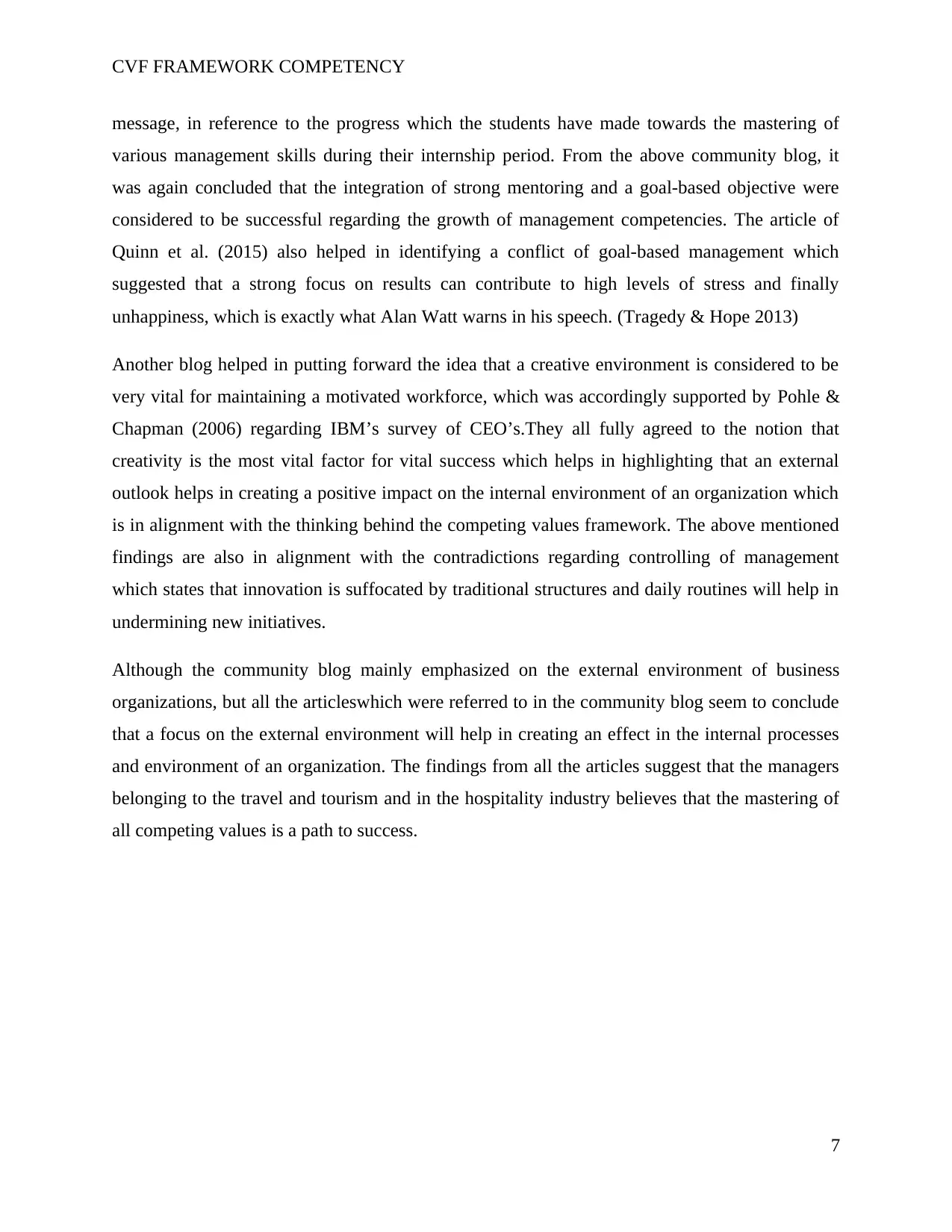
CVF FRAMEWORK COMPETENCY
message, in reference to the progress which the students have made towards the mastering of
various management skills during their internship period. From the above community blog, it
was again concluded that the integration of strong mentoring and a goal-based objective were
considered to be successful regarding the growth of management competencies. The article of
Quinn et al. (2015) also helped in identifying a conflict of goal-based management which
suggested that a strong focus on results can contribute to high levels of stress and finally
unhappiness, which is exactly what Alan Watt warns in his speech. (Tragedy & Hope 2013)
Another blog helped in putting forward the idea that a creative environment is considered to be
very vital for maintaining a motivated workforce, which was accordingly supported by Pohle &
Chapman (2006) regarding IBM’s survey of CEO’s.They all fully agreed to the notion that
creativity is the most vital factor for vital success which helps in highlighting that an external
outlook helps in creating a positive impact on the internal environment of an organization which
is in alignment with the thinking behind the competing values framework. The above mentioned
findings are also in alignment with the contradictions regarding controlling of management
which states that innovation is suffocated by traditional structures and daily routines will help in
undermining new initiatives.
Although the community blog mainly emphasized on the external environment of business
organizations, but all the articleswhich were referred to in the community blog seem to conclude
that a focus on the external environment will help in creating an effect in the internal processes
and environment of an organization. The findings from all the articles suggest that the managers
belonging to the travel and tourism and in the hospitality industry believes that the mastering of
all competing values is a path to success.
7
message, in reference to the progress which the students have made towards the mastering of
various management skills during their internship period. From the above community blog, it
was again concluded that the integration of strong mentoring and a goal-based objective were
considered to be successful regarding the growth of management competencies. The article of
Quinn et al. (2015) also helped in identifying a conflict of goal-based management which
suggested that a strong focus on results can contribute to high levels of stress and finally
unhappiness, which is exactly what Alan Watt warns in his speech. (Tragedy & Hope 2013)
Another blog helped in putting forward the idea that a creative environment is considered to be
very vital for maintaining a motivated workforce, which was accordingly supported by Pohle &
Chapman (2006) regarding IBM’s survey of CEO’s.They all fully agreed to the notion that
creativity is the most vital factor for vital success which helps in highlighting that an external
outlook helps in creating a positive impact on the internal environment of an organization which
is in alignment with the thinking behind the competing values framework. The above mentioned
findings are also in alignment with the contradictions regarding controlling of management
which states that innovation is suffocated by traditional structures and daily routines will help in
undermining new initiatives.
Although the community blog mainly emphasized on the external environment of business
organizations, but all the articleswhich were referred to in the community blog seem to conclude
that a focus on the external environment will help in creating an effect in the internal processes
and environment of an organization. The findings from all the articles suggest that the managers
belonging to the travel and tourism and in the hospitality industry believes that the mastering of
all competing values is a path to success.
7
Paraphrase This Document
Need a fresh take? Get an instant paraphrase of this document with our AI Paraphraser
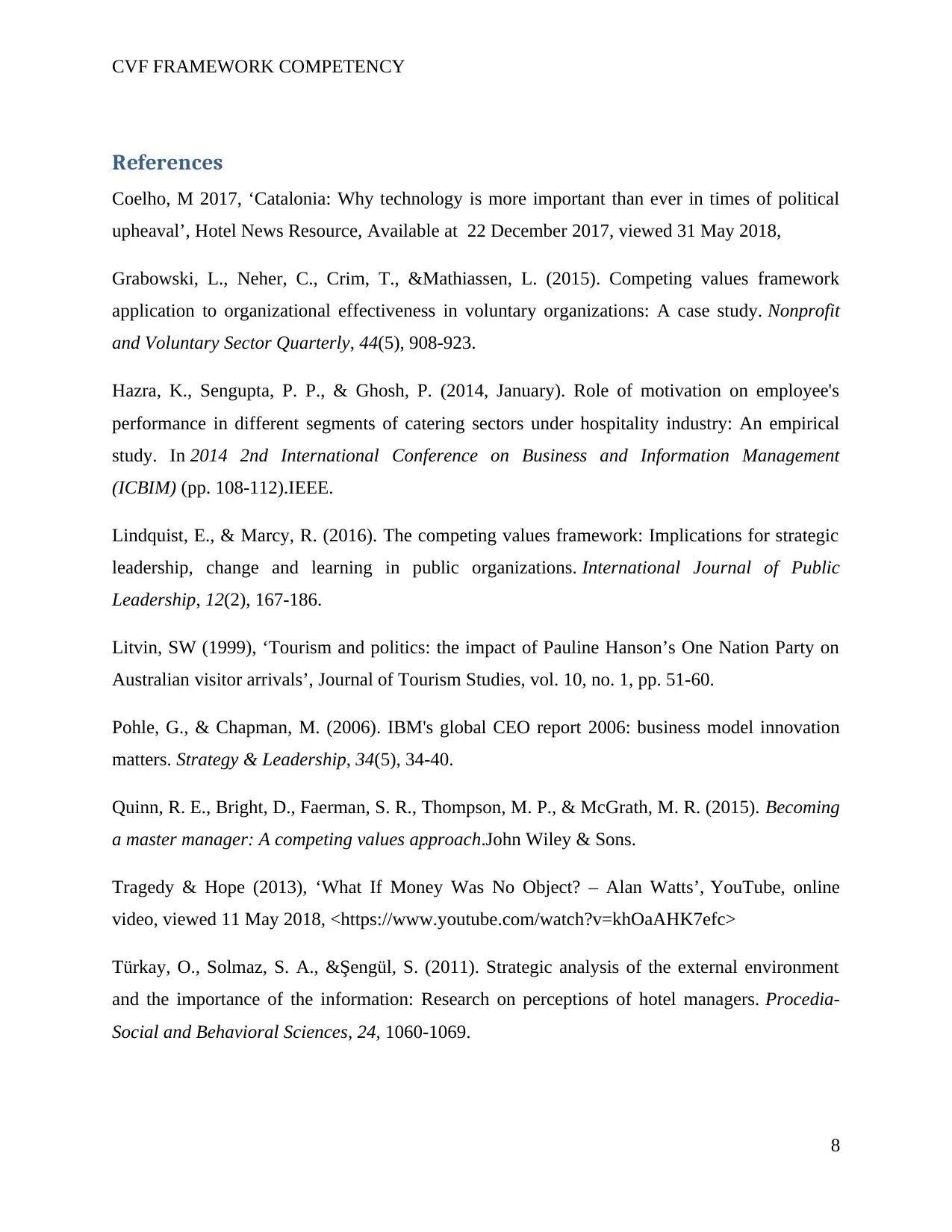
CVF FRAMEWORK COMPETENCY
References
Coelho, M 2017, ‘Catalonia: Why technology is more important than ever in times of political
upheaval’, Hotel News Resource, Available at 22 December 2017, viewed 31 May 2018,
Grabowski, L., Neher, C., Crim, T., &Mathiassen, L. (2015). Competing values framework
application to organizational effectiveness in voluntary organizations: A case study. Nonprofit
and Voluntary Sector Quarterly, 44(5), 908-923.
Hazra, K., Sengupta, P. P., & Ghosh, P. (2014, January). Role of motivation on employee's
performance in different segments of catering sectors under hospitality industry: An empirical
study. In 2014 2nd International Conference on Business and Information Management
(ICBIM) (pp. 108-112).IEEE.
Lindquist, E., & Marcy, R. (2016). The competing values framework: Implications for strategic
leadership, change and learning in public organizations. International Journal of Public
Leadership, 12(2), 167-186.
Litvin, SW (1999), ‘Tourism and politics: the impact of Pauline Hanson’s One Nation Party on
Australian visitor arrivals’, Journal of Tourism Studies, vol. 10, no. 1, pp. 51-60.
Pohle, G., & Chapman, M. (2006). IBM's global CEO report 2006: business model innovation
matters. Strategy & Leadership, 34(5), 34-40.
Quinn, R. E., Bright, D., Faerman, S. R., Thompson, M. P., & McGrath, M. R. (2015). Becoming
a master manager: A competing values approach.John Wiley & Sons.
Tragedy & Hope (2013), ‘What If Money Was No Object? – Alan Watts’, YouTube, online
video, viewed 11 May 2018, <https://www.youtube.com/watch?v=khOaAHK7efc>
Türkay, O., Solmaz, S. A., &Şengül, S. (2011). Strategic analysis of the external environment
and the importance of the information: Research on perceptions of hotel managers. Procedia-
Social and Behavioral Sciences, 24, 1060-1069.
8
References
Coelho, M 2017, ‘Catalonia: Why technology is more important than ever in times of political
upheaval’, Hotel News Resource, Available at 22 December 2017, viewed 31 May 2018,
Grabowski, L., Neher, C., Crim, T., &Mathiassen, L. (2015). Competing values framework
application to organizational effectiveness in voluntary organizations: A case study. Nonprofit
and Voluntary Sector Quarterly, 44(5), 908-923.
Hazra, K., Sengupta, P. P., & Ghosh, P. (2014, January). Role of motivation on employee's
performance in different segments of catering sectors under hospitality industry: An empirical
study. In 2014 2nd International Conference on Business and Information Management
(ICBIM) (pp. 108-112).IEEE.
Lindquist, E., & Marcy, R. (2016). The competing values framework: Implications for strategic
leadership, change and learning in public organizations. International Journal of Public
Leadership, 12(2), 167-186.
Litvin, SW (1999), ‘Tourism and politics: the impact of Pauline Hanson’s One Nation Party on
Australian visitor arrivals’, Journal of Tourism Studies, vol. 10, no. 1, pp. 51-60.
Pohle, G., & Chapman, M. (2006). IBM's global CEO report 2006: business model innovation
matters. Strategy & Leadership, 34(5), 34-40.
Quinn, R. E., Bright, D., Faerman, S. R., Thompson, M. P., & McGrath, M. R. (2015). Becoming
a master manager: A competing values approach.John Wiley & Sons.
Tragedy & Hope (2013), ‘What If Money Was No Object? – Alan Watts’, YouTube, online
video, viewed 11 May 2018, <https://www.youtube.com/watch?v=khOaAHK7efc>
Türkay, O., Solmaz, S. A., &Şengül, S. (2011). Strategic analysis of the external environment
and the importance of the information: Research on perceptions of hotel managers. Procedia-
Social and Behavioral Sciences, 24, 1060-1069.
8
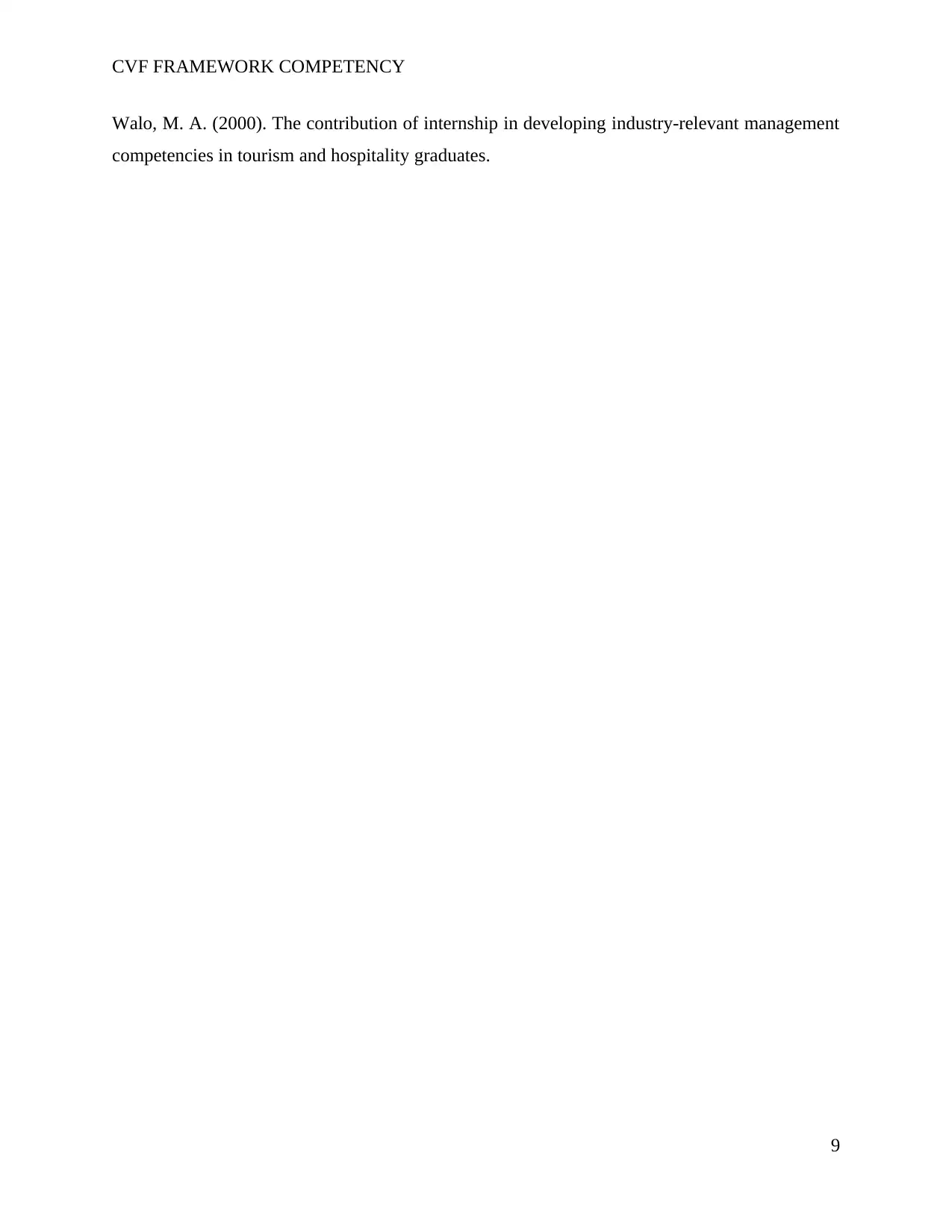
CVF FRAMEWORK COMPETENCY
Walo, M. A. (2000). The contribution of internship in developing industry-relevant management
competencies in tourism and hospitality graduates.
9
Walo, M. A. (2000). The contribution of internship in developing industry-relevant management
competencies in tourism and hospitality graduates.
9
⊘ This is a preview!⊘
Do you want full access?
Subscribe today to unlock all pages.

Trusted by 1+ million students worldwide
1 out of 9
Related Documents
Your All-in-One AI-Powered Toolkit for Academic Success.
+13062052269
info@desklib.com
Available 24*7 on WhatsApp / Email
![[object Object]](/_next/static/media/star-bottom.7253800d.svg)
Unlock your academic potential
Copyright © 2020–2026 A2Z Services. All Rights Reserved. Developed and managed by ZUCOL.





